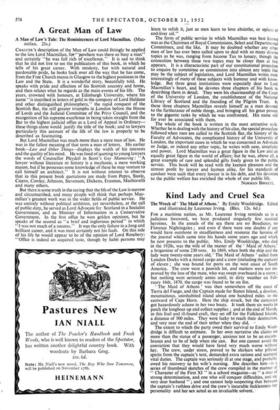A - Great Man of Law
CHAUCER 'S description of the Man of Law could fittingly be applied to the late Lord Macmillan, fornpowhere was there so busy a man" and certainly "he was full rich of excellence." It is sad to think that he did not live to see the publication of this book, in which he tells of his great career. With modesty, but with natural and pardonable pride, he looks back over all the way that he has come, from the Free Church manse in Glasgow to the highest positions in the Law and the State. It is a wonderful story, beautifully told. He speaks with pride, and affection of his Scottish ancestry and home, and then relates what he regards as the main events of his life. The years, crowned with honours, at Edinburgh University, where his name "is inscribed in letters of gold in the company of Lord Haldane and other distinguished philosophers," the rapid conquest of the Scottish Bar, the still greater triumphs in London before the House of Lords and the Judicial Committee of the Privy Council, and the , recognition of his supreme excellence in being taken straight from the Bar to the highest judicial office as a Lord of Appeal in Ordinary— these things alone would justify the title of the book; and to lawyers particularly this account of the life of the law is properly to be described as fascinating.
But Lord Macmillan was much more than a mere man of law. He was in the fullest meaning of that term a man of letters. His earlier book—Law and Other Things—displays the width of his interests and the quality of his mind. He was fond of quoting to young lawyers the words of Counsellor Pleydell in Scott's Guy Mannering: "A lawyer without literature or history is a mechanic, a mere working mason, but if he possesses some knowledge of these he may venture to call himself an architect." It is not without interest to observe that in this present book quotations are made from Pepys, Steele, Cicero, Cowley, Johnson, Stevenson; Dickens, Erasmus, Machiavelli and many others.
But there is some truth in the saying that the life of the Law is narrow and circumscribed, and many people will think that perhaps Mac- millan's greatest work was in the wider fields of public service. He was entirely without political ambition, yet nevertheless, at the call of public duty, he served as Lord Advocate fer Scotland in a Socialist Government, and as Minister of Information in a Conservative Government. In the first office he won golden opinions, but he speaks of the second as "a brief and inglorious period" in which 'I was not much of a success." It was the only failure in a ,Iong and -brilliant career, and it was most certainly not his fault. On this side of his life he would appear to be of the opinion of Lord Rosebery: "Office is indeed an acquired taste, though by habit persons may learn to relish it, just as men learn to love absinthe, or opium or cod-liver oil."
The form of public service in which Macmillan was best known was as the Chairman of Royal Commissions, Select and Departmental Committees, and the like. It may be doubted whether any other man of law has ever been called upon to deal with so many diverse topics as he was, ranging from Income Tax to lunacy, though the connection between these two topics may be closer than at first appears. It is a characteristic part of our constitutional procedure to enquire by committee or commission into almost any topic that may be the subject of legislation, and Lord Macmillan writes most interestingly of many of these subjects with humour and with know- ledge. But three great institutions were especially dear to Lord Macmillan's heart, and he devotes three chapters of his book to describing them in detail: They were his chairmanship of the Court of the University of London, the establishment of the National Library of Scotland and the founding of the Pilgrim Trust. In these three chapters Macmillan reveals himself as a man devoted to the furtherance of noble things, and bringing all his great powers to the gigantic tasks by which he was confronted. His name will for ever be associated with them.
The whole of the book is written in the most attractive style. Whether he is dealing with the history of his clan, the special procedure followed when men are called to the Scottish Bar, the history of the Faculty of Advocates, the complicated history of the University of London; the important cases in which he was concerned as Advocate or Judge, or indeed any other topic, he writes with ease, simplicity and power. Lord Macmillan was a great figure in the Law and an equally great figure in the world of affairs; but he was, above all, a great example of rare and splendid gifts freely given to the public service. This book will be read with the keenest pleasure and the utmost profit by lawyer and layman alike, for his standards of conduct were such that every lawyer is in his debt, and his devotion to the public welfare has enriched the whole of our public life.
NORMAN BIRKETT.


































 Previous page
Previous page